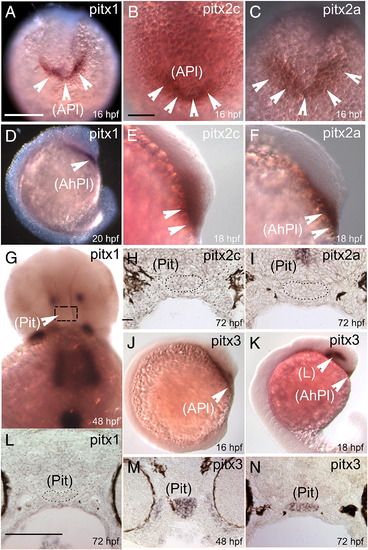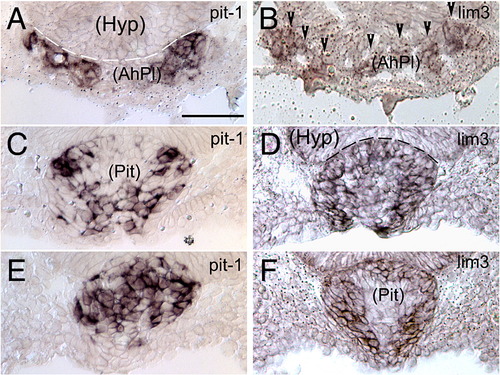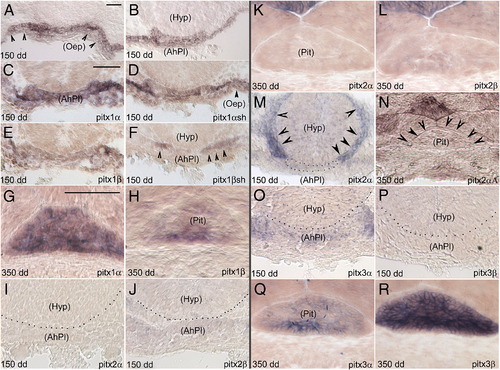- Title
-
Independent and dynamic reallocation of pitx gene expression during vertebrate evolution, with emphasis on fish pituitary development
- Authors
- Angotzi, A.R., Ersland, K.M., Mungpakdee, S., Stefansson, S., and Chourrout, D.
- Source
- Full text @ Gene
|
Expression patterns of pitx1, pitx2a, pitx2c and pitx3 genes during zebrafish pituitary development. Stages are indicated on the lower-right corner of each panel. Expression domains are marked by arrows in the following structures: anterior placode (APl), adenohypophyseal placode (AhPl), lens (L), pituitary (Pit). Note the loss of expression in the pituitary at late developmental stages (48 and 72 hpf), for pitx1, pitx2c and pitx2a genes (G,L, H and I, respectively). In Fig. 2G, the area where the gland should appear if marked with pitx1 is indicated by the dash-lined box. Scale bar for (A,D,J,K) and (G) = 200 μm; (B,C,E,F) and (L–N) = 100 μm; (H,I) = 50 μm. EXPRESSION / LABELING:
|
|
Expression patterns of two early pituitary markers (pit-1 and lim3) during salmon pituitary development at 150 dd (A,B), 170 dd (C,D) and 184 dd (E,F). Gene names are indicated on the upper-right corner of each panel. Pit-1 and lim3 sites of expression are the adenohypophyseal placode (AhPl) and the developing pituitary (Pit) adjacent to the hypothalamus (Hyp) outlined by a dotted line. All panels are equally scaled (scale bar = 50 μm). |
|
Pituitary expression patterns of the salmon pitx- gene complement analyzed on serial sections at early and late stages of embryonic development. Gene names and stages of development are indicated on the lower-right and left corner of each panel, respectively. (A,B): pitx1 expression analysis using a probe cross-hybridizing with the four pitx1 transcripts. (C,D,E): pitx1α, pitx1αsh and pitx1β expression in the oral cavity epithelium (Oep), and in adenohypophyseal placode (AhPl). (F): pitx1βsh transcripts in the dorsal sides of the (AhPl). (I,J/O,P) and (K,L/Q,R): expression analysis of pitx2α/pitx2β and pitx3α/pitx3β paralog-pairs at 150 and 350 dd respectively. (M): note the circular expression domain of pitx2α in the hypothalamus (Hyp; marked by arrows), and the absence of expression in the adenohypophyseal placode (outlined by dots). (N): lack of pitx2αA gene expression in the developed pituitary; the border of the gland is indicated by arrows. Scale bar for (A,B), (C–F,M,N), (G–L) and (O–R) = 50 μm. |

Unillustrated author statements EXPRESSION / LABELING:
|
Reprinted from Gene, 417(1-2), Angotzi, A.R., Ersland, K.M., Mungpakdee, S., Stefansson, S., and Chourrout, D., Independent and dynamic reallocation of pitx gene expression during vertebrate evolution, with emphasis on fish pituitary development, 19-26, Copyright (2008) with permission from Elsevier. Full text @ Gene



